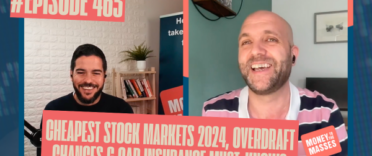The 30th episode of my weekly Youtube show where I discuss what is happening in investment markets and what to look out for. Each show lasts between 5-10 minutes and is aimed at DIY investors (including novices) seeking contemporary analysis to help them understand how investment markets work.
Subscribe to my Youtube channel to receive my weekly analysis of investment markets or alternatively you can listen via my weekly Midweek Markets podcast below.
This week I reveal how I made a profit from Brexit and the US-China trade war despite increasing volatility in the market and the fact that 98% of professional investment managers lost money.
We have just crossed over into September after a very tough August for professional investment managers. If you look at the mixed shares sector which has a 40 to 85 % equity content, then the average fund lost 2.62% during the month of August. That was because there was an increase in trade tensions; don't forget Donald Trump threw a trade war tantrum again by proposing to raise tariffs. Some of those tariffs came into effect this week on the 1st of September, but also in August we had an increased chance of a no-deal Brexit happening at the end of October.
Of course professional managers may have had a tough time but I personally had a very good month with my own 50k portfolio with 8020 investor. Members will know that I made 0.63% profit during that month, now to put it into context if you look at the 223 fund managers within that mixed sector that I mentioned 219 of them lost money during August and that's because they were very growth focused. The reason why I was able to make a profit despite the volatility and seemingly that professional managers didn't, was because I held REITs (which are real estate investment trusts), some utilities exposure, I had exposure to GILTs and other fixed interest. If you want to know how I did it then go and take out the free trial on 80-20 investor.
So where are we now that we've entered September? We're largely where we were at the end of August, there are no definite dates for trade war negotiations or talks. We've got the new tariffs that have come into effect and of course we've got the Chinese currency still tumbling. Those are the negatives that are impacting markets and they're largely centred around the trade war, but we've also had economic data that has disappointed, we've had some of the worst manufacturing data in years in the US and the UK, in fact in the US manufacturing contracted for the first time in three years and in the UK we had the worst manufacturing data for seven years.
To balance that out, we've had some positives in the last week, for example in Hong Kong Carrie Lam has actually agreed or apparently agreed to withdraw the extradition bill, we've had stability or some seeming stability in Italian politics as well and that's helped push markets up. So we've had a bit of a balance we are still whipsawing, so if you remember last week I talked about the S&P 500, I said go and get your stock market out and you will see the bounce between around 2,850 on the S&P; 500 and 2,940 on the S&P; 500 and we're still range-bound, we're still trading with a lot of volatility and what's happening is traders are coming back from their holiday and so we're getting a little bit more volume in the trades and markets are seemingly trying to decide whether they're going to break higher or break much lower and that will only come to light in the coming days and months.
Of course we've got the fear index is still where it was last week (around 18) and bonds are still being paid handsomely, so investors in bonds are probably loving this environment at the moment and all the uncertainty because the US Treasury bond yield for the 10-year is still at 1.47 and of course gold is still doing very well indeed. The dollar has rallied. It is a haven currency and that has impacts for emerging markets which I have covered in previous shows and will come on to in future episodes.
One of the hurdles for the market is payroll data, with the announcement of job numbers in the US on Friday and they could cause a bit of a wobble. So we've still got all this angst with trade we've got poor economic data we've got to keep an eye on all those headlines and also obviously what is happening politically in Europe, in Italy and also in Hong Kong. Now, as a UK investor you cannot have failed to notice the collapse of the pound. We've seen the pound way down towards $1.22 to $1.21 against the dollar this week we broke below $1.20 against the dollar.
That is a level we've not seen for a number of years and in fact the last time the pound traded regularly for an extended period of time below $1.20 was back in the mid 1980s just before Ferris Buler took his famous day off. The impact for your portfolio is that anything in UK large caps (so FTSE 100), had a bit of a kicker from that currency falling (the pound against the dollar and the pound against nearly every other currency in fact) it also meant that any overseas Holdings you had got a nice currency boost, so you would have seen it in your portfolio. Equally anything that was UK focused purely (so things like UK small caps) would have had a little bit of a hit because the reason for the fall in the pound was of course the uncertainty surrounding brexit and Boris Johnson trying to force through and no-deal Brexit by the end of October.
Of course we had Parliament try and stop him, so where we are at the moment is British politics is in a mess and ironically, despite the fact we don't seem to have anybody running this country right now, that was a positive for the pound, so it had a little bit of a pickup. it rallied from $1.19 back up to about $1.21 / $1.22 against the dollar, so that was some good news. It just shows you the volatility that we're going to see in the coming weeks ahead, so something to bear in mind. Again, Brexit headlines are making a massive impact, expect more volatility and be careful not to be caught out by it.
Midweek Markets weekly podcast
Other ways to watch, listen and subscribe
You can listen to other episodes and subscribe to the show by searching 'Money to the Masses' on Spotify or by using the following links:



